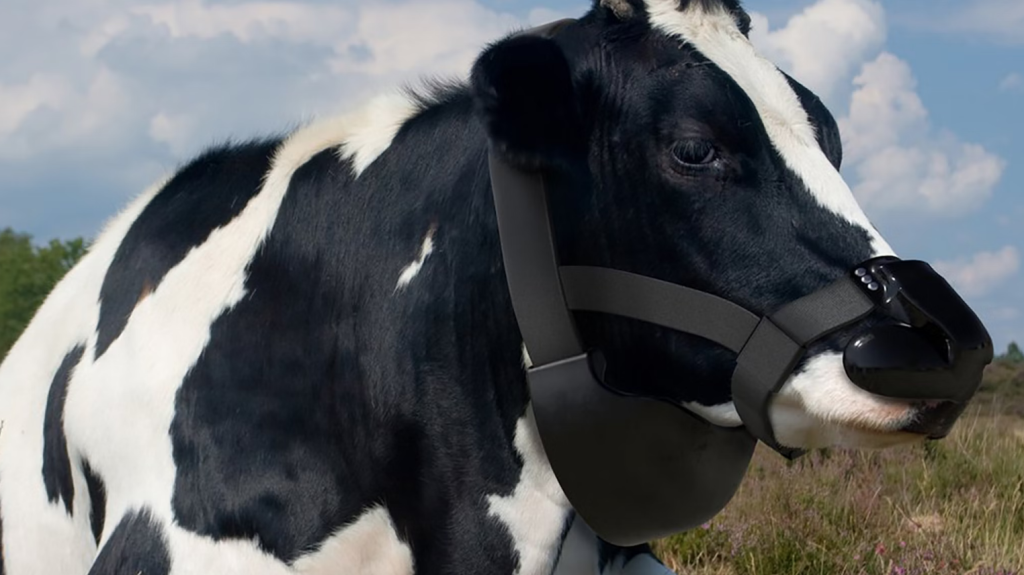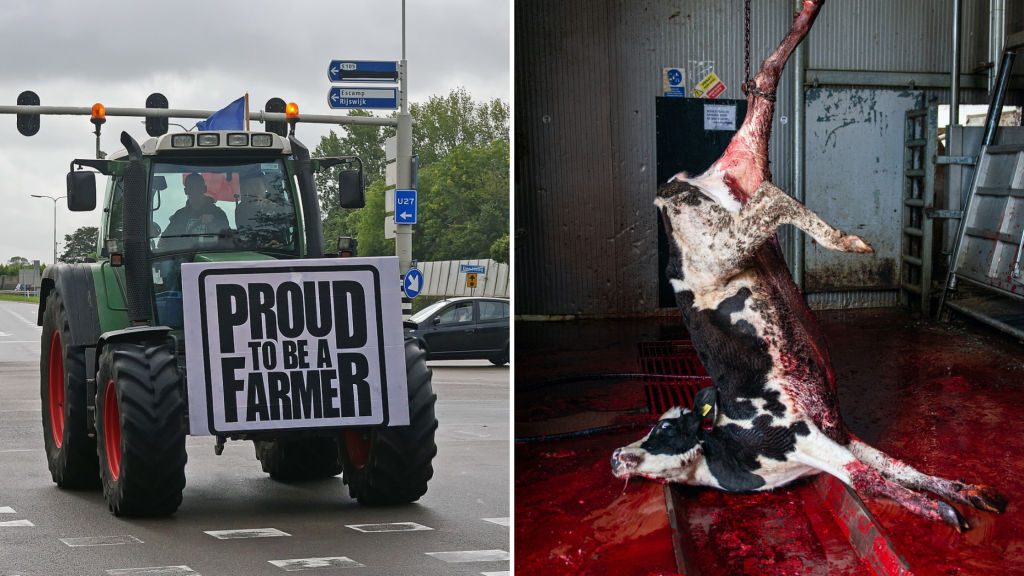
During Covid, I became alienated from almost everyone I knew. I was called a far-right extremist for defending democracy and fundamental freedoms; an anti-vaxxer for expressing skepticism about Big Pharma; and a conspiracy theorist for questioning the government’s motives.
I quickly came to realize I had more in common with everyone but leftists. The irony of this development is not lost on me. Leftists became the loudest mouthpieces for authoritarianism (though this was already fully underway pre-Covid). Left became right and right became left.
Inevitably I found myself more aligned with pro-freedom groups, but pro-freedom groups also came to disappoint me, mainly because of their paradoxical stance on our food system, specifically the notion that animal agriculture is somehow compatible with being pro-freedom. (By ‘pro-freedom’ I’m referring to the stance in which fundamental freedoms, autonomy, civil liberties, and the preservation of individual rights are valued–a position long abandoned by liberals).
Fundamentally, the pro-freedom movement’s defense of meat consumption is flawed on many levels.
For one, pro-freedom groups seem to associate animal consumption with a ‘natural’ way of living, a return to the simple life just like our ancestors.
One Dutch farmer said, “Farmers aren’t against nature, we live in nature, we depend on nature and we want to preserve it.”
‘Natural’ and ‘nature’ are two words commonly thrown around by farmers and pro-freedom groups.
But the animal agriculture industry is anything but natural.
Over 99% of farm animals live in factory farms globally.
Factory farms (or ‘Concentrated Animal Feeding Operations’ — CAFOs) are nondescript, windowless buildings that house thousands of animals at a time in an artificial, crowded, toxic environment. They’re the result of an industry that seeks to maximize profits at the expense of the animal’s well being.
Because these facilities are so unnatural, they don’t require traditional farming experience. In fact, one need not be a farmer at all. Factory farm operators simply need to monitor the technology, primarily the HVAC system, which is the most important component in maintaining a factory farm.
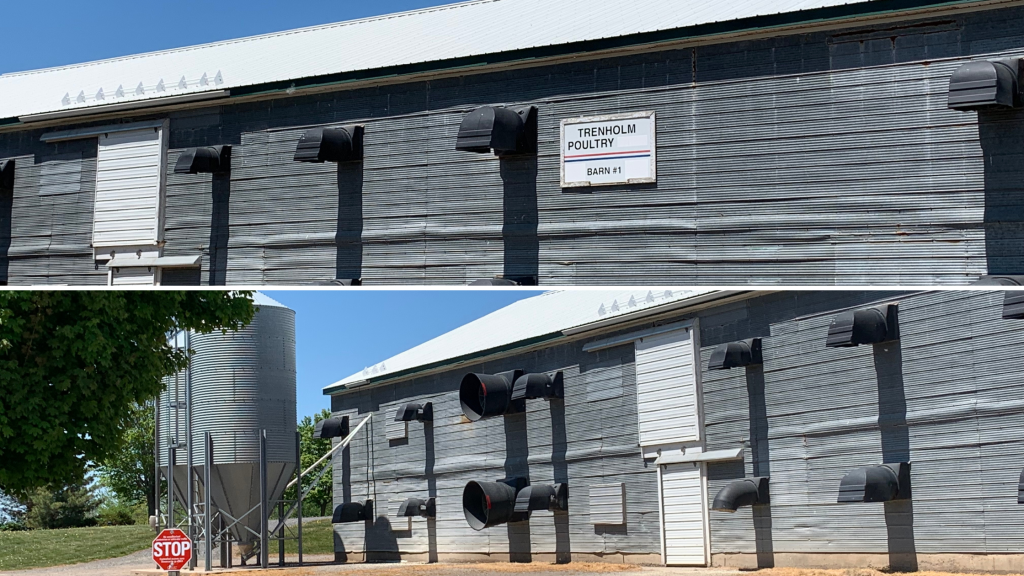
In a standard chicken factory farm for example, confined chickens are injected with growth hormones (some of which have been outlawed in Europe due to their increase of risk for cancer and other illnesses) and steroids and fed a poor diet meant to increase their body size at an unnatural rate so they can be killed at a younger age. Because of the cramped conditions, they’re unable to establish a social hierarchy, which is a critical, natural behaviour for them. On many farms they’re also debeaked to reduce cannibalism of other chickens because they are not able to act out their natural behaviours.
In the 1950s, chickens were killed at about 84 days, now they are killed at about 45 days old.
It’s more economical to keep chickens, pigs, and other farm animals in poor conditions and feed them food devoid of nutrients, including plastic and slaughterhouse floor scraps. They eat and sleep and live out their unbearably short lives covered in their own feces and urine and blood. They are routinely administered antibiotics, which has led to global antibiotic resistance-one of the most pressing public health crises we face today. Their natural movements and instincts are physically and psychologically stifled. The only time they will ever see the light of day is when they’re thrown onto transport trucks to be sent to the slaughter.
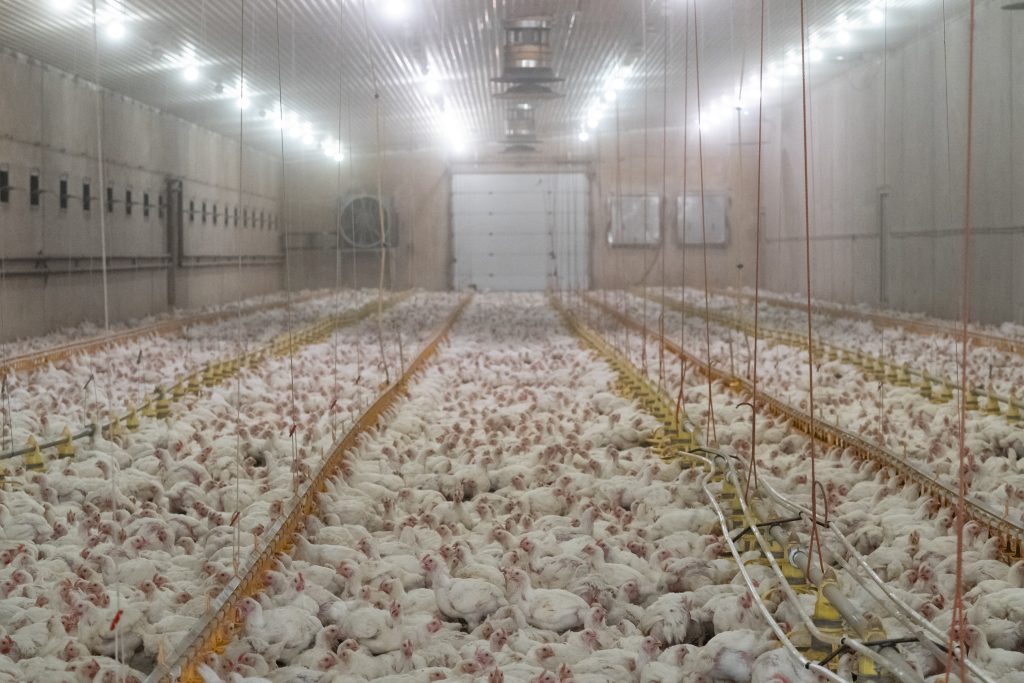
On top of this, because of these unnatural environments, animal products are often contaminated with a number of viruses and bacteria, including salmonella, listeria, and E. coli. Campylobacter–the number one cause of diarrheal illness in the US and is linked to Guillain-Barre syndrome–infects 98% of store-bought chickens.
Animal ag also employs a number of buzzwords to deceive consumers into thinking they are buying ‘natural’, ‘sustainable’ and/or ‘humane’ meat.
This factory farm, for example, has the following signage out front, indicating that the chicken farm is part of the ‘Raised by a Canadian Farmer Animal Care‘ program with the Chicken Farmers of Canada.
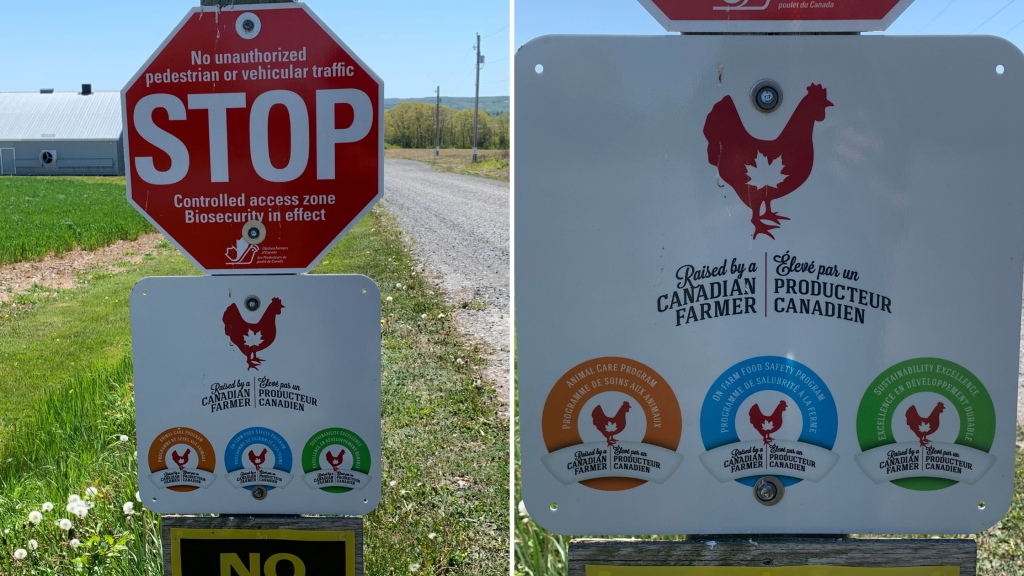
This Canadian program is a clever marketing tactic used by animal ag lobbyists to sell the idea that meat can be ethically and sustainably sourced. Even more concerning is that partnering organizations have given their stamp of approval, including the Canadian Veterinary Medical Association. According to this program, the treatment of animals in factory farms is considered ‘high standard’ of care.
Relatedly, the local farm you get your meat from still relies on government subsidies and humane washing. No farm is immune from these tactics.
Even the backyard chicken boom is the product of an unnatural and exploitative industry. Backyard chickens come from commercial hatcheries where they have been genetically modified to suffer and produce an unnatural number of eggs than they can stand condemning the fate of the hen to a lifetime of illness and disease, including lameness, broken bones, prolapse, and heart failure.
As an added bonus: animal ag poisons oceans, rivers, tap water, rainforests, soil, and everything else in the natural world.
Some may pull out the hunting argument as the only ‘natural’ alternative. When proponents think of hunting, they conjure up images of our ancestors, running around naked, ambushing animals and killing them using only wooden spears. This could not be further from the truth. Hunting requires thousands of dollars worth of equipment: hunting apparel, rifles, trail cameras, backpack, binoculars, etc. There are parks used for the express purpose of hunting, so hunters have their own playground they can access to hunt animals. There are more tools available than ever to aid hunters.
None of this is natural.

Additionally, Big Ag has a long and fruitful relationship with Big Pharma.
The pharmaceutical industry profits greatly from poisoning farm animals (and subsequently humans) with toxins, including growth hormones and antibiotics in an effort to maximize profits. Pharmaceutical companies make about $5 billion a year from producing antibiotics for farm animals.
The government is also intimately tied to animal agriculture.
Every minute, $1 million dollars is given to subsidize the farming industry all around the world. In 2019, the Trump administration gave $16 billion in subsidies to American farmers. Less than 1% of U.S. food subsidies goes towards vegetables, but corn and soy are heavily funded by the government because the majority of these crops are used to feed animals bred and killed for food.
In the UK, around 90% of the annual profit of farmers who graze livestock comes from agriculture subsidies. Fruit farmers comparatively only receive 10 percent.
It confounds me that pro-freedom proponents look at the government critically in all other areas, but they fail to see how farmers are directly propped up by the very elites they criticize.
Even when consumer demand is low, farmers will still yield the same amount of animal products to generate profits. This results in an oversupply of “product” which has to either be thrown out or added to other products. But the dairy industry has been hard at working trying to resolve this.
In 2018, the national dairy checkoff program sought to increase demand for dairy products by partnering with a number of fast food chains, including Pizza Hut, Taco Bell, McDonalds, and Dominos. It also secured partnerships with fast food chains in Latin America and the Caribbean and Asia Pacific regions.
Because of this program, Pizza Hut added 25% more cheese to its pizzas to artificially increase demand and chip away at the oversupply of milk. So even if consumers do not buy dairy products from the grocery store, programs like this funded by dairy lobbyists will still find ways to produce the same amount of dairy to continue making profits. This is government interventionism on steroids, and farmers had no problem with this. Even if you consume dairy products, there is no reason why anyone should willingly support such a deceitful and exploitative practice.
For a number of reasons, no thanks to the globalists who have been hard at work curbing our freedoms under the guise of climate action, pro-freedom groups adopted a hardline stance on meat consumption. To them, farming livestock directly challenges the establishment, while anything opposite to that (i.e., promoting plant-based food) signals the inevitable globalist takeover.
Certainly there is an element of truth to this. All around the world we are seeing more restrictions imposed on farmers under the guise of meeting arbitrary climate pledges. The Dutch government announced plans to shut down thousands of farms to halve nitrogen emissions by 2030, spurring global protests. That same year, the Dutch government also made the world’s largest public investment in cultivated meat, investing 60 million euro in the emerging market. The EU recently approved some $1.61 billion to buy out farmers, and is currently in talks about creating transition plans to help farmers transition into growing other less resource-intensive crops.
While Dutch livestock farmers have been the most hard hit by climate tyranny, criticism leveled against the government ignores the government’s long standing relationship with farmers in the years leading up to these climate policies.
Dutch farmers have been relying on government funding for years. They’re just some of thousands of farmers in the EU who receive hundreds of millions in subsidies every year, regardless of consumer demand.
Indeed, agricultural subsidies in the EU jumped from 3.2 billion euros in 1970 to 55.7 billion euros in 2021.
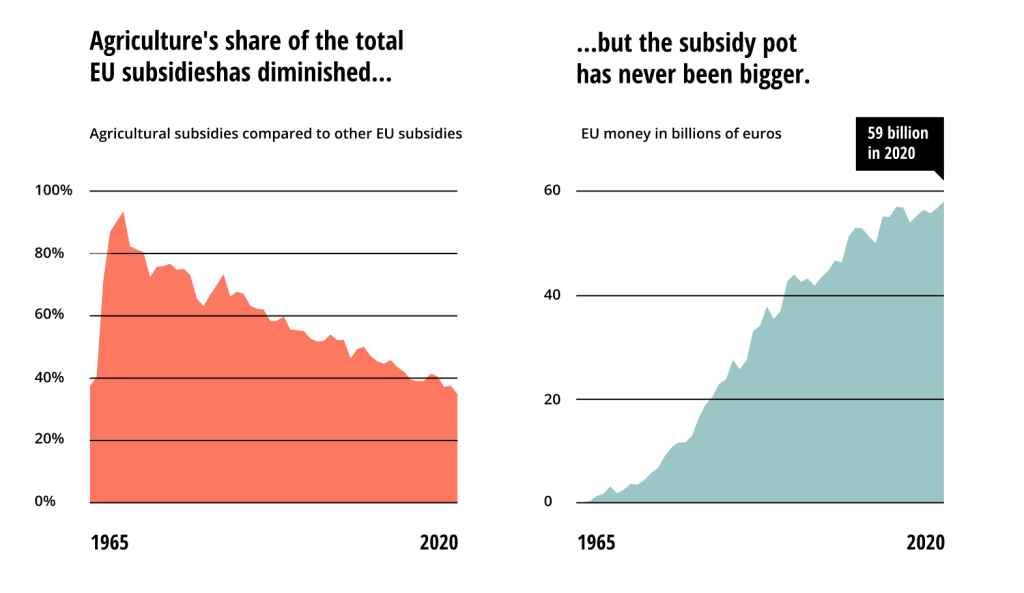
The government has been pulling the strings for a long time, and pro-freedom supporters seemed to be okay with this–until they weren’t.
From the anti-globalist perspective, critics associate plant-based eating with Agenda 2030. Klaus Schwab and his goons are already pushing insect consumption; Bill Gates has invested millions in plant-based companies and greenwashing technology to make animal ag more ‘climate-friendly’, and more leaders are pushing lab grown meat. But that’s the point. These unelected and elected leaders are opportunists who will jump at any opportunity that will grant them more money and more power.
Bill Gates might invest in plant-based companies, but he also invests in ‘climate-friendly’ animal ag initiatives (he gave $4.8 million to a company producing gas masks for cows). Gates is also enjoying his position as the largest owner of farmland in the U.S, which is common for the rich. The USDA estimates about 30% of farmland is owned by landlords who don’t farm themselves.
For those who are anti-establishment, this is a confronting paradox.
Pro-freedom groups are critical of the government and the ruling class, but they seem to disregard the close relationship governments have with animal agriculture. Your meat is the direct result of an incestuous relationship between farmers, animal ag lobbyists, big pharma, and government.
Supporting freedom for all necessarily demands us to question everything. It’s about having a healthy dose of skepticism for all the things we’ve been told not to question. This road, for many, leads to veganism.
Historically, veganism has been an important part of certain anti-establishment subcultures. Questioning the food industry leads you to question the government, society, and the rules–both unwritten and written–that govern our lives and influence us to live in a way that keeps us enslaved, both financially and otherwise.
An unfortunate side effect of the current cultural zeitgeist is the implication that plant-based diets are part of the globalist agenda. But the reality is: there is little money to be made promoting fruits and vegetables. I suspect the globalist push for plant-based junk food and insect consumption will only lead to more backlash and further taint the cause. But advocating for a whole foods, plant-based diet does not mean one also supports the globalist agenda. It’s the most consistent, logical position that adheres to anti-establishment ideals, yet somehow pro-freedom advocates seem to be the most at odds with it.
Freedom for all means not participating in industries, where practicable, that exploits its workers, other living beings, and the planet. This does not mean we aim to be perfect, but it is important that we at least acknowledge the relationship the government has had with animal ag for many years, and question the context in which all of these tyrannical policies are able to take place.
Feature image:
Description: A young bovine stares outwards through an opening inside the back of a transport truck that has arrived at a cattle slaughterhouse.
Credit: Martina Zamudio / We Animals Media (2018)
